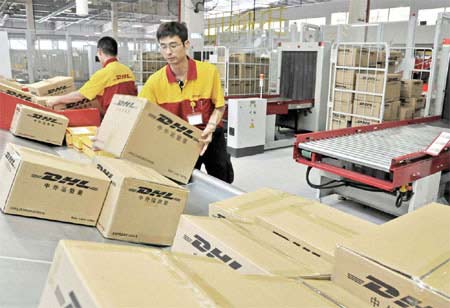European investors cool toward China
Updated: 2012-10-29 14:07
By Diao Ying and Li Jiabao (China Daily)
|
|||||||||||
|
 |
|
Employees work at the DHL North Asia hub in Shanghai. The $175 million investment project was put into operation on July 12. European investment so far this year has declined by 6.3 percent year-on-year because of China's slowdown and the eurozone debt crisis. Xiao Yang / for China Daily |
Foreign direct investment from EU slowing along with economic growth
China's economic slowdown and the sovereign debt crisis have taken a toll on bilateral investment between China and Europe, recent data shows.
Foreign direct investment from the European Union to China declined 6.3 percent year-on-year from January to September to $4.83 billion (3.7 billion euros), according to the Chinese Ministry of Commerce. China's outbound investment to Europe also dropped by 30.3 percent over the period, compared with a 35 percent increase to Russia and 22.2 percent to Japan.
Foreign direct investment fell for the 10th time in 11 months in September, reaching $8.43 billion, down 6.8 percent year-on-year. This year only May bucked the downward trend with a slight gain, according to the ministry. In total, the first nine months saw China's FDI decline 3.8 percent year-on-year to $83.42 billion.
"Decline is the general picture for FDI in China as rising costs have reduced its attraction for foreign investors and investment opportunities have shrunk following rapid rises in FDI over recent decades," says Li Xunlei, deputy general manager and chief economist at Haitong Securities Co Ltd.
According to Xiang Songzuo, chief economist of the Agricultural Bank of China Ltd, slowing economic growth combined with poor global economic conditions have dented the enthusiasm of foreign investors.
"China still needs FDI, but investment is more likely to flow to fields such as the Internet and finance and foreign investment guidelines will be subject to further adjustment," he says.
Xiang adds that slowing FDI inflows will affect China's economic restructuring and shows a lack of optimism among foreign companies about China's economic prospects.
China's GDP growth slowed from 9.7 percent in the first quarter of 2011 to 7.4 percent in the third quarter of this year, dragged down primarily by a decline in investment and exports.
"In the short term, declining FDI will not severely affect China's economic growth. But economic expansion will almost certainly slow in the future," Li says.
"China will maintain relatively fast economic growth and retain a certain attraction in terms of FDI. But the challenges will increase from other emerging economies, such as Vietnam, India and Indonesia."
Ministry data also shows an increase in investment flows from some European countries. This year, investment from Germany has risen 29.1 percent, from the Netherlands it is up 38.9 percent and from Switzerland it has almost doubled.
Investment flows from Europe to China began to decline last year. In 2011, flows from China to the EU rose 94 percent to $4.28 billion, while investment from the 27 European countries to China fell 3.7 percent to $6.35 billion.
Bilateral trade reached $567.2 billion in 2011, up from $100 billion in 2003, with an annual growth rate of 20.8 percent in the past eight years. The two sides are on course to be each others biggest trading partners by 2015. Currently China is both the EU's second-largest trading partner and fastest-growing export market while the EU has been China's biggest trading partner for eight years in a row. China is also Europe's largest source of imports.
Bilateral investment has been rising fast. Companies from the EU have invested more than $80 billion in China in total. China's investment in Europe has also been increasing rapidly. China invested only $100 million in Europe in 2003, compared to $4.3 billion in 2011.
Related Stories
China's success of core interest to Europe: EU leader 2012-10-19 21:32
China has confidence on EU market, says PBOC 2012-10-15 11:23
Eurozone may look to Beijing for funds 2012-10-10 10:14
China backs EU efforts to address debt crisis 2012-09-14 09:28
Premier Wen confident about EU development 2012-09-12 13:27
Europe remains tough export market 2012-08-16 03:32
Today's Top News
President Xi confident in recovery from quake
H7N9 update: 104 cases, 21 deaths
Telecom workers restore links
Coal mine blast kills 18 in Jilin
Intl scholarship puts China on the map
More bird flu patients discharged
Gold loses sheen, but still a safe bet
US 'turns blind eye to human rights'
Hot Topics
Lunar probe , China growth forecasts, Emission rules get tougher, China seen through 'colored lens', International board,
Editor's Picks

|

|

|

|

|

|





